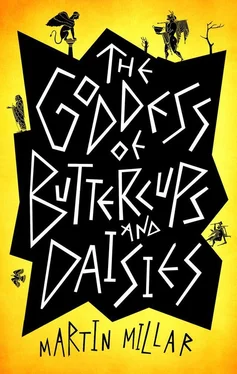The woman is a curse. I’ve never encountered anything like it. If she continues roaming around like this, something very bad is going to happen .
Bremusa looked for Metris. It took a while to locate her, but eventually she came across her at the entrance to the Long Walls that ran down to Piraeus. She was sitting with two children, amusing them by making daisies and buttercups appear beneath their feet. The children looked happy. At least someone in Athens was.
‘Hello, Bremusa! I’ve been playing with my new friends. This is Plato, he’s nine, and Xenophon, he’s eight. We’ve been having a picnic.’
They looked like a grubby, unintelligent pair of children to Bremusa, though they did seem happier than the last time she’d encountered them, when they’d been fighting on the beach. She noticed their nanny, slumbering peacefully on a bench nearby.
‘Athena wants to see you.’
From the tone of Bremusa’s voice, it should have been obvious that Metris was in trouble, but the nymph was too impervious to the world around her to notice. It didn’t occur to her that the goddess might be angry with her.
‘All right,’ she said, cheerfully. She looked down at her companions.
‘I’ll see you again later. We can play some more.’
Plato and Xenophon waved goodbye to their new friend. Bremusa had to admit that she’d rarely seen happier-looking children than those two at that moment. The nymph obviously did have some powers of spreading contentment. If only she could apply herself, she might be able to do something to thwart Laet, or at least ameliorate the effect of her malign influence.
When they arrived at the private shrine, the goddess herself appeared. Metris greeted her as cheerfully as a woman meeting a friend for a pleasant shopping trip.
‘Thanks for sending me to Athens! I do so like it here!’
The Goddess Athena glared at her. ‘What’s this I hear about you and this Luxos the poet?’
‘He’s really nice!’ enthused the nymph. ‘He has lovely blond hair and he writes beautiful poems.’
The goddess was not impressed by either the lovely hair or the beautiful poems. ‘Didn’t I instruct you assist Bremusa?’
‘I needed to comfort Luxos. He was upset after —’
‘Silence! You’re not there to comfort Luxos, you’re there to help bring peace!’
Metris fell silent, for the first time realising that all was not well. She looked a little abashed.
‘Sorry, Goddess.’
Athena leaned forward. ‘Metris, listen well. You are to stay with Bremusa and assist her. You must have no more distractions. I forbid you to see Luxos again.’
Metris quailed. ‘But —’
‘Enough! Now do as I say! Apply yourself to the task I set you or I’ll make you regret it.’
Metris was upset as they left the shrine. Bremusa was pleased. It was time someone talked some sense into the young fool.
Another complete waste of time. Aristophanes rested his head on his hands as he sat in the open-air meeting place, while politicians and demagogues rose to harangue each other. He still felt queasy from his drinking exploits. He wished he were back at rehearsals. There were so many things he needed to attend to. The last rehearsal had been a shambles. It was customary for three actors to share the speaking roles in Athenian comedies, changing their masks as necessary to represent different characters. This could make it difficult for them to learn their lines but up till now that hadn’t been a problem in this production. While everything else had gone wrong, Philippus and his two fellow processionals had at least managed to learn the script. Unfortunately, they’d now forgotten it again. Aristophanes had watched, anguished, as each actor stumbled over their lines, finally grinding to a complete halt, wondering who was meant to speak next, and what they were meant to say.
‘You knew these lines yesterday!’ raged Aristophanes.
‘Sorry.’ Philippus had the good grace to look embarrassed. ‘They’ve just completely gone out of my head. Something strange in the air in Athens these days. My art is suffering.’
‘I’ll make his art suffer,’ muttered Aristophanes, now slumped in the baking heat. ‘I’ll make them all suffer. We’ll have a speed run through the script at dawn tomorrow. That’ll teach them to forget their lines. Great Zeus, that sun is hot. I wish I could get out of here.’
Unfortunately, the assembly lasted even longer than usual. In between all the arguing about the failing peace conference, there was a report from Delos, one of Athens’ allies. They were asking for help but Athens didn’t seem to be in a position to help anyone at the moment. Or if they were, no one could agree how to go about it. The failure to agree on any means to assist their ally caused more bad feeling.
There was one other item on the agenda. The ancient Altar of Pity had split in two. News of this had already spread. Though the altar was not a major place of worship in comparison to the city’s great temples, it was a well-known site, and did have a place in the city’s heritage. The chairman of the committee responsible for public worship reported that it had most likely just fallen apart with age, and would be repaired from public funds. He urged people not to regard it as a bad omen, but most people did exactly that. Some of the more emotional citizens declared that the city was cursed, and that neither Zeus nor Athena would ever show mercy on them again.
Aristophanes found the news about the altar more depressing than anything else. He’d secretly harboured thoughts about saying a prayer there himself, even though, strictly speaking, a failing play would not be regarded as the sort of serious problem normally taken to the Altar of Pity.
Might have been worth a shot anyway, he thought, morosely . Nothing else is working.
When the assembly was finally over, he tried to escape without anyone noticing him, but Nicias waylaid him outside the exit. For a man who’d just been denounced as a traitor who was taking bribes from the Spartans, Nicias seemed quite even-tempered. Aristophanes supposed he was used to it. He’d been involved in Athenian politics for a long time, and had learned how to keep an even temper. Even the malaise that had settled over the city seemed to be affecting him less than others.
‘These meetings are getting worse,’ sighed the politician.
‘Don’t give up. The population wants peace, no matter what Hyperbolus and Lamachus say.’
‘Really? You’d be hard-pressed to tell that from today’s assembly. It’s like they’ve all gone insane. What happened to drive everyone mad?’
‘I don’t know. Perhaps the gods really do have it in for us this time.’
Nicias looked concerned. A few of his supporters tried to get his attention, but he brushed them away, maintaining his grip on Aristophanes’ arm.
‘There’s not much time left,’ he told the playwright. ‘The peace conference is meant to end on the last day of the festival. We have to make this city enthusiastic about peace again. If the population don’t want it, the delegates won’t either. No one is going to risk his neck by signing an unpopular treaty.’
He looked Aristophanes in the eye. ‘I need your play to go well.’
‘I doubt my play will make any difference.’
‘It advocates peace, doesn’t it?’
‘Yes, but…’ Aristophanes raised his hands hopelessly. ‘It’s not looking good.’
‘Why not?’
‘No money. And maybe I’m a poor writer anyway.’
Nicias was surprised. ‘I counted you as one of the vainest men in Athens. Since when did you lack confidence?’
‘I don’t know. Nothing seems right these days.’
Читать дальше












